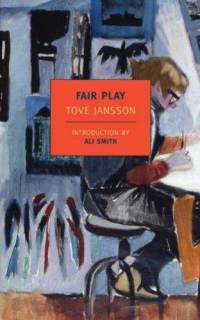
Fair Play, Thomas Teal’s translation of Tove Jansson’s Swedish novel Rent Spel, is distinct from the average American novel. It is seemingly about nothing in particular, as it chronicles the day-to-day lives of partners Mari and Jonna. Mari is a writer and Jonna is an artist, and each women values her craft immensely.
This short novel is actually semi-autobiographical. Jansson, who was born in 1914 and died in 2001, was raised in a very creative atmosphere. Both of her parents were artists, and this exposure to creativity at an early age probably contributed to her career as an artist and then a writer. Jansson is most well-known for her children’s books, particularly those involving the imaginary character Moomintroll, but later in her career she published a few works for adults.
Her long-term partner Tuulikki Pietilä was an artist, and her relationship with Pietilä closely mirrors Mari and Jonna’s relationship in Fair Play. The Swedish phrase labora et amare, which translates into “work and love,” was thought to be Jansson’s mantra; she was quoted as saying that the most important aspect of her life was work, then love. Her tendency to value work more than romance was one of her most distinguishing characteristics. This idea was also the basis for Fair Play, as the novel, in depicting the mundane, shows how Mari and Jonna balance the two passions.
I can’t help but compare this novel to every chick flick that has ever come to theaters with a storyline something like this: the classic “modern woman” who is on the fast track to achieving success in her career finds the man of her dreams and realizes that love trumps career. This is a very typical story in American culture. Career-driven men and women are so often depicted as unhappy – until they fall in love. Therefore, Jansson’s book suggests an idea that is very un-American. Fair Play makes the reader consider the possibility that one can find happiness by discovering one’s true-life vocation, not only by finding “the one.”
Another aspect of this novel that is very unconventional is the lesbian relationship that the novel depicts. In most American novels that involve a lesbian relationship, the book’s main focus is the homosexual nature of the relationship and how the characters struggle to come to terms with it. Fair Play does not approach the homosexual relationship in this way; in fact, this aspect of the relationship does not attract much of the reader’s attention and does not act as the story’s conflict. This depiction of homosexuality is very un-American in that it is easily accepted as normal. It leads me to believe that the intended audience, that is, the Swedish population, is more comfortable and accepting of gay and lesbian relationships than Americans.
Because it is unlike most novels that I have come across, I felt that Fair Play was a refreshing read. It does not have a particularly exciting plot, but the novel requires some reading between the lines that leaves the story open to interpretation.

Dear Courtney,
I was very happy to read your piece about Fair Play. I am a big fan of Tove Jansson, and try to track the ongoing discussion the best I can.
First of all, I would like to correct a couple of minor mistakes: Tove Jansson was Finnish, but she wrote in her mother tongue, Swedish (look up Swedish-speaking finns on the internet). So any reaction to her sexual expression in the book wold have firstly been received by Finns, but thanks to the language she wrote in, also by Swedes. “Labora et amare” is of course Latin, not Swedish.
I was not in Finland when the book was published, but it certainly wasn’t a scandal. At around the same time, Tove and her partner Tuulikki participated as a couple at a televized public function. Again, a couple of eyebrows were raised but not much more than that. Tove’s position as a living national treasure probably helped.
To round off, I must confess that I’ve never read Fair Play. I’ve read and reread her Moomin novels over and over again – they may ostensibly be children’s books , however especially the later titles double as fully fledged novels for adults.
So thank you very much for your well-written piece, I hope you will discover more of Tove Jansson’s work. And I promise I will get my act together and read Fair Play.
All the best, Ekoda